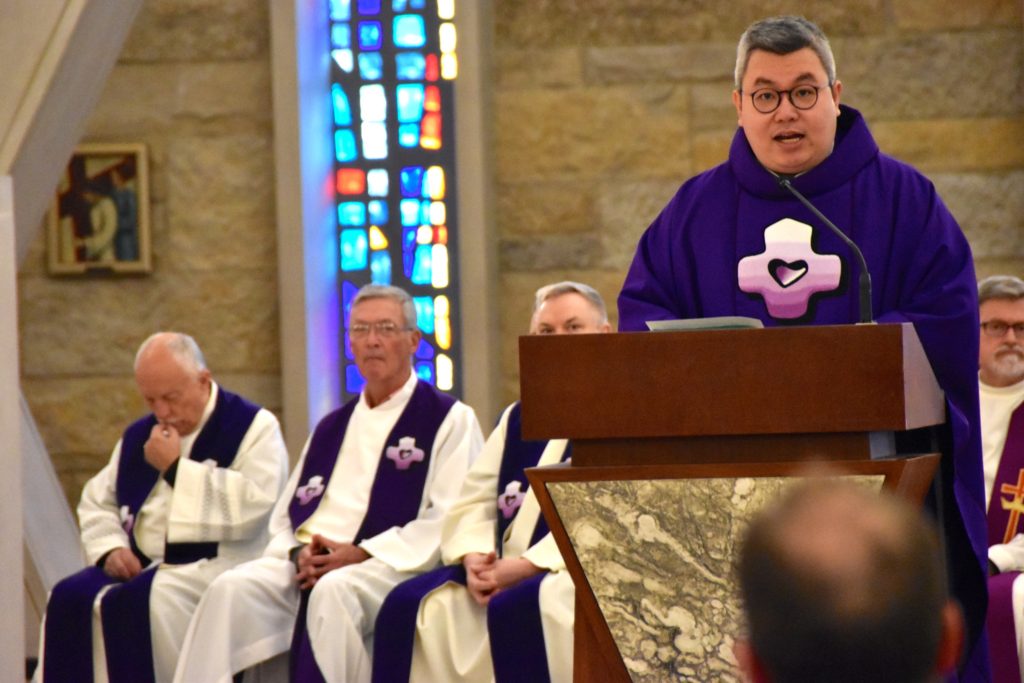
We invite Dehonians, co-workers and other collaborators in SCJ ministry to share their personal reflections regarding the impact of the coronavirus (COVID-19) in their lives and their communities. The following is from Fr. Albertus Joni, SCJ, a member of the Indonesian Province doing graduate studies at Marquette University.
I was still enjoying my three-month study break in Indonesia when the WHO [World Health Organization] announced the pandemic threats of this deadly new string of coronavirus. Having been born in Asia – the most populous continent in the world – this kind of disease was not truly shocking news for me. I thought that we were going to be able to handle the crisis well as we had responded efficiently to SARS (Severe Acute Respiratory Syndrome) in 2004.
I was wrong. A lot of people were wrong. As of this writing (04/03), there are already more than a million confirmed cases with the death tolls of 55,092. This COVID-19 pandemic has touched me personally both as a Dehonian and an Asian.
Before returning to Milwaukee I still had a chance to see how Asians are struggling to adjust themselves to the “new normal.” The social distancing policy is effective, but it means only one thing for the poor: failure to survive. In Indonesia, there are about 2 million gig drivers (Uber, Gojek, Grab) who cannot afford to self-isolate. This pandemic is punishing the poor in Malaysia as more than 50% of its workforce relies on informal sectors. Grocery store assistants and kitchen hands do not have the luxury of working from home. Thai people are still gathering in their traditional boat markets. Their jobs cannot be done remotely. Their families need to survive on their daily income.
Even in an ultra-modern country like Japan, where you can easily find robots serving you in hotels or restaurants, there is a large number of poor people who struggle to survive amidst this pandemic. Japan’s Prime Minister, Shinzō Abe, created the new economic policy known as “Abenomics” in 2012, which heavily relies on tourism. The unpredictable outbreak affects Japan significantly. “No tourists, no good,” says Hiro, one of my Japanese friends who resides in Osaka. Japanese low-income families will also suffer from the cancellation of the Olympics 2020 in Tokyo.
Upon my return to the United States to continue my graduate studies, I see an even more brutal reality of suffering and death caused by this novel coronavirus. I witness how the front-line workers are fighting this virus bravely. I also see how millions of unfortunate people are losing their jobs. These sad encounters make me realize how vulnerable our modern society is despite all of its scientific and technological achievements.
There is no better moment to reflect the on meaning of suffering than Holy Week. While we are approaching the sacred Easter season, I realize that both globalization and capitalism – two common “highways” toward a prosperous society – cannot properly solve our problems. This COVID-19 outbreak challenges me to see the other side of the coin. This pandemic shows us that the modern world desperately needs what Jesus has revealed to us all: solidarity. Through the cross, Jesus entered into full solidarity with the suffering of the world, with the vulnerability of being human. As Jesus went into the mystery of human death, He showed us that we – the disciples – also need to enter into the suffering of our neighbors.
While our society is heavily marked with social injustice and an ever widening gap between the haves and the have-nots, we, Christians, are called to show the world that our brothers and sisters are more than calculations, predictions, and numbers. Christians see their neighbor not only as an autonomous human being with rights and fundamental equality but as the living image of God the Father, redeemed by the blood of Jesus Christ and placed under the permanent action of the Holy Spirit. This is why self-isolation is NOT a reason NOT to act, to witness this truth. We can start simply by showing friendly gestures or encouragement in helping others in need.
I am now engaged in virtual volunteering with Vinea Dei Foundation. Working together with the Archdiocese of Jakarta, we help to provide safety equipment for front-line health workers in Eastern Indonesia. More and more organizations are engaging people who want to contribute their skills and time via the internet.
I am proud of so many Dehonians who turn to social media platforms and broadcast their Masses and Eucharistic Adorations. They keep spreading the message of love and solidarity for the people in need of hope and encouragement. Every act of solidarity celebrates the love of God to humanity, and vice versa. It becomes an instrument of communion with God! Yes, this is a difficult time for everyone – yet, I do believe that this is also the moment to share the best of us and of what we believe in.
